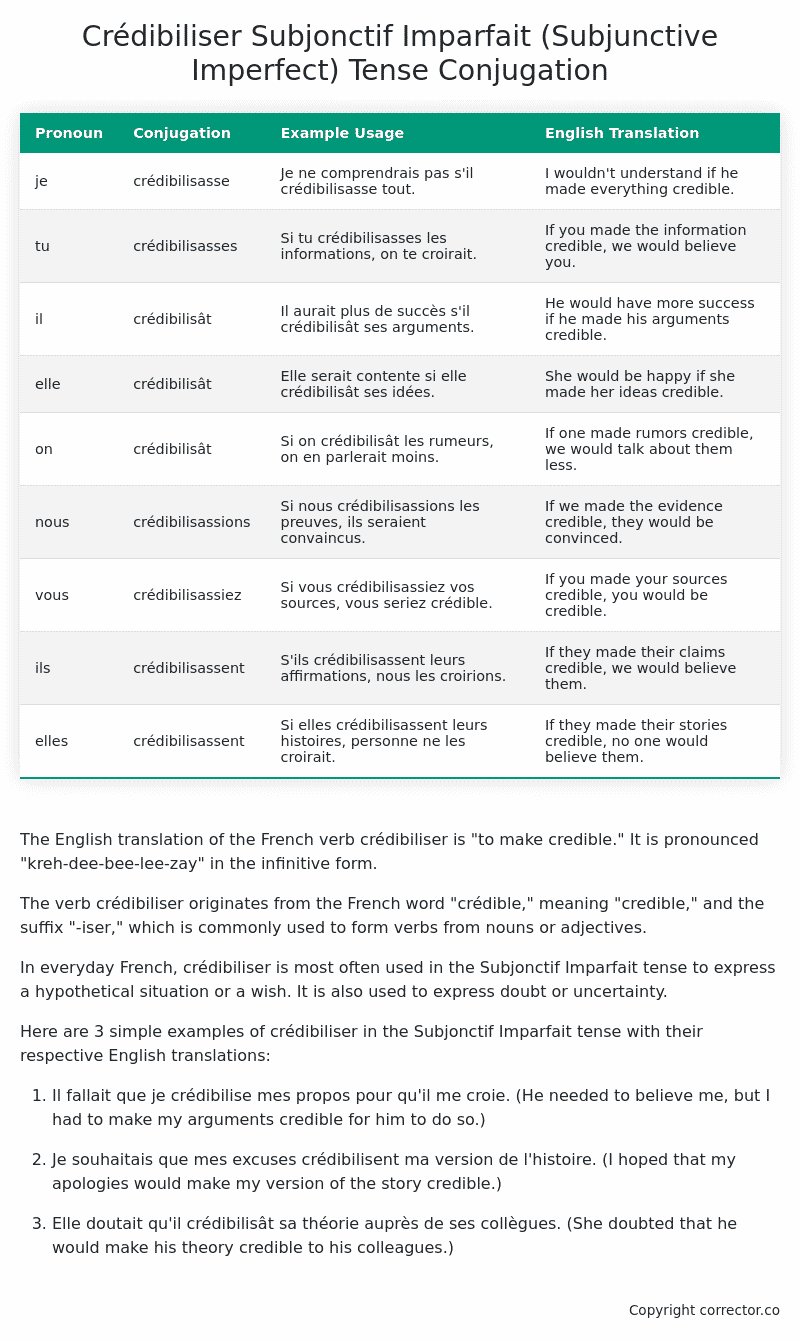Subjonctif Imparfait (Subjunctive Imperfect) Tense Conjugation of the French Verb crédibiliser
Introduction to the verb crédibiliser
The English translation of the French verb crédibiliser is “to make credible.” It is pronounced “kreh-dee-bee-lee-zay” in the infinitive form.
The verb crédibiliser originates from the French word “crédible,” meaning “credible,” and the suffix “-iser,” which is commonly used to form verbs from nouns or adjectives.
In everyday French, crédibiliser is most often used in the Subjonctif Imparfait tense to express a hypothetical situation or a wish. It is also used to express doubt or uncertainty.
Here are 3 simple examples of crédibiliser in the Subjonctif Imparfait tense with their respective English translations:
-
Il fallait que je crédibilise mes propos pour qu’il me croie.
(He needed to believe me, but I had to make my arguments credible for him to do so.) -
Je souhaitais que mes excuses crédibilisent ma version de l’histoire.
(I hoped that my apologies would make my version of the story credible.) -
Elle doutait qu’il crédibilisât sa théorie auprès de ses collègues.
(She doubted that he would make his theory credible to his colleagues.)
Table of the Subjonctif Imparfait (Subjunctive Imperfect) Tense Conjugation of crédibiliser
| Pronoun | Conjugation | Example Usage | English Translation |
|---|---|---|---|
| je | crédibilisasse | Je ne comprendrais pas s’il crédibilisasse tout. | I wouldn’t understand if he made everything credible. |
| tu | crédibilisasses | Si tu crédibilisasses les informations, on te croirait. | If you made the information credible, we would believe you. |
| il | crédibilisât | Il aurait plus de succès s’il crédibilisât ses arguments. | He would have more success if he made his arguments credible. |
| elle | crédibilisât | Elle serait contente si elle crédibilisât ses idées. | She would be happy if she made her ideas credible. |
| on | crédibilisât | Si on crédibilisât les rumeurs, on en parlerait moins. | If one made rumors credible, we would talk about them less. |
| nous | crédibilisassions | Si nous crédibilisassions les preuves, ils seraient convaincus. | If we made the evidence credible, they would be convinced. |
| vous | crédibilisassiez | Si vous crédibilisassiez vos sources, vous seriez crédible. | If you made your sources credible, you would be credible. |
| ils | crédibilisassent | S’ils crédibilisassent leurs affirmations, nous les croirions. | If they made their claims credible, we would believe them. |
| elles | crédibilisassent | Si elles crédibilisassent leurs histoires, personne ne les croirait. | If they made their stories credible, no one would believe them. |
Other Conjugations for Crédibiliser.
Le Present (Present Tense) Conjugation of the French Verb crédibiliser
Imparfait (Imperfect) Tense Conjugation of the French Verb crédibiliser
Passé Simple (Simple Past) Tense Conjugation of the French Verb crédibiliser
Passé Composé (Present Perfect) Tense Conjugation of the French Verb crédibiliser
Futur Simple (Simple Future) Tense Conjugation of the French Verb crédibiliser
Futur Proche (Near Future) Tense Conjugation of the French Verb crédibiliser
Plus-que-parfait (Pluperfect) Tense Conjugation of the French Verb crédibiliser
Passé Antérieur (Past Anterior) Tense Conjugation of the French Verb crédibiliser
Futur Antérieur (Future Anterior) Tense Conjugation of the French Verb crédibiliser
Subjonctif Présent (Subjunctive Present) Tense Conjugation of the French Verb crédibiliser
Subjonctif Passé (Subjunctive Past) Tense Conjugation of the French Verb crédibiliser
Subjonctif Imparfait (Subjunctive Imperfect) Tense Conjugation of the French Verb crédibiliser (this article)
Conditionnel Présent (Conditional Present) Tense Conjugation of the French Verb crédibiliser
Conditionnel Passé (Conditional Past) Tense Conjugation of the French Verb crédibiliser
L’impératif Présent (Imperative Present) Tense Conjugation of the French Verb crédibiliser
L’infinitif Présent (Infinitive Present) Tense Conjugation of the French Verb crédibiliser
Struggling with French verbs or the language in general? Why not use our free French Grammar Checker – no registration required!
Get a FREE Download Study Sheet of this Conjugation 🔥
Simply right click the image below, click “save image” and get your free reference for the crédibiliser Subjonctif Imparfait tense conjugation!

Crédibiliser – About the French Subjonctif Imparfait (Subjunctive Imperfect) Tense
Formation
Common Everyday Usage Patterns
Interactions with Other Tenses
Subjonctif Présent
Indicatif Passé Composé
Conditional
Conditional Perfect
Summary
I hope you enjoyed this article on the verb crédibiliser. Still in a learning mood? Check out another TOTALLY random French verb conjugation!


